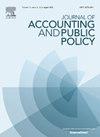Crowding-out or Calling-out? The influence of mandatory industry-related firm-specific information disclosure on analyst reports
IF 3.3
3区 管理学
Q1 BUSINESS, FINANCE
引用次数: 0
Abstract
To improve the information environment, the Chinese stock exchanges issued mandatory industry-related firm-specific information disclosure (IFID) guidelines for various industries in batches from 2013 to 2021. Utilizing the staggered implementation of IFID guidelines, we apply a staggered difference-in-difference method to assess analysts’ reactions to mandatory IFID. Our analysis, which employs text analysis and machine learning techniques, reveals that mandatory IFID stimulates more industry-related firm-specific information in analyst reports, supporting the calling-out effect of IFID on analyst reports. Furthermore, we document that IFID significantly reduces the text similarity of industry-related information across different analyst reports for the same firm, suggesting that analysts engage in more personalized, in-depth industry-related analyses rather than simply replicating the firm’s disclosed information post-IFID. Additionally, IFID prompts analysts to conduct more on-site visits to gather private information and produce more comprehensive industry-related insights. We also explore various factors that may influence the effectiveness of IFID at the industry, firm, and analyst levels. The heterogeneity test results show that the calling-out effect of IFID on analyst reports is strengthened by lower industry competition, better firm transparency, and higher analyst specialization. Overall, our study demonstrates that mandatory IFID in China improves the information environment by directly compelling listed firms to disclose more industry-related operating information and indirectly encouraging analysts to produce more differentiated and insightful analyses.
挤出还是叫停?与行业相关的强制性公司特定信息披露对分析师报告的影响
为改善信息环境,中国证券交易所从 2013 年至 2021 年分批发布了各行业的强制性行业信息披露指引(IFID)。利用交错实施 IFID 准则的特点,我们采用交错差分法来评估分析师对强制性 IFID 的反应。我们的分析采用了文本分析和机器学习技术,结果显示,强制性 IFID 激发了分析师报告中更多与行业相关的公司特定信息,支持了 IFID 对分析师报告的呼唤效应。此外,我们还记录到,IFID 显著降低了同一公司不同分析师报告中行业相关信息的文本相似度,这表明分析师在 IFID 后会进行更个性化、更深入的行业相关分析,而不是简单复制公司披露的信息。此外,IFID 还促使分析师进行更多的实地考察,以收集私人信息,并提出更全面的行业相关见解。我们还从行业、公司和分析师层面探讨了可能影响 IFID 效果的各种因素。异质性检验结果表明,行业竞争程度较低、公司透明度较高以及分析师专业化程度较高,都会加强 IFID 对分析师报告的呼唤效应。总之,我们的研究表明,中国的强制性 IFID 直接迫使上市公司披露更多与行业相关的经营信息,间接鼓励分析师做出更有差异化和洞察力的分析,从而改善了信息环境。
本文章由计算机程序翻译,如有差异,请以英文原文为准。
求助全文
约1分钟内获得全文
求助全文
来源期刊

Journal of Accounting and Public Policy
Multiple-
CiteScore
4.80
自引率
2.80%
发文量
75
期刊介绍:
The Journal of Accounting and Public Policy publishes research papers focusing on the intersection between accounting and public policy. Preference is given to papers illuminating through theoretical or empirical analysis, the effects of accounting on public policy and vice-versa. Subjects treated in this journal include the interface of accounting with economics, political science, sociology, or law. The Journal includes a section entitled Accounting Letters. This section publishes short research articles that should not exceed approximately 3,000 words. The objective of this section is to facilitate the rapid dissemination of important accounting research. Accordingly, articles submitted to this section will be reviewed within fours weeks of receipt, revisions will be limited to one, and publication will occur within four months of acceptance.
 求助内容:
求助内容: 应助结果提醒方式:
应助结果提醒方式:


